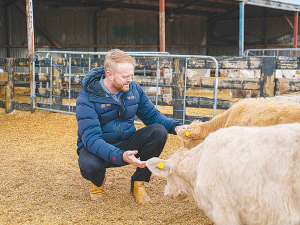Success in calf rearing is often measured by minimising health issues, reducing mortality rates, and achieving high growth rates.
According to Probiotic Revolution’s Matt Collier, probiotics have proven to be a game-changer in large-scale operations where disease challenges are significant.
Collier has long advocated for the use of probiotics alongside higher milk feeding rates.
“This approach prevents nutritional scours, enhances digestion, and boosts intake of meal, hay, and grass. The result is faster growth, with a survey showing calves reaching target weaning weights 11 days earlier,” he explains.
Farmers consistently report notable improvements in calf health, with cleaner tails and shinier coats. Collier notes that one experienced farmer, who has reared 50 calves annually for 30 years, noted that for the first time, they had no sick calves or losses.
Health improvements are even more significant in large-scale operations, especially when bull calves come from multiple sources, where good colostrum intake cannot always be guaranteed. In such cases, rotavirus and cryptosporidium can have severe effects.
Kapuka dairy farmers Brooke and Blair McKenzie rear 800 heifer and bull calves annually.
Last spring, they experienced only two unexplained calf losses after they left their calf rearing shed.
They vaccinate half their cows for rotavirus, using their gold colostrum with a brix reading of over 22 to start the calves. However, with such a large rearing operation their calves still have some rotavirus challenges every year and some diarrhoea occurs after disbudding.
They primarily manage these health issues by strengthening immunity through daily feeding of Calf Xtreme. When disease strikes, they increase the Calf Xtreme dosage three to four times, administer BioRescue probiotic paste, and provide an electrolyte drink. They will also use an anti-inflammatory and a mild antibiotic if needed.
Brooke emphasises the role of nutrition in these results: “We now feed 7 to 8 litres of milk once a day by day 10, instead of 3 litres twice daily. This change has significantly increased hay consumption by 3 to 4 weeks of age, and the daily weight gains up to December are around 1kg/day. With faster growth and improved immunity from Calf Xtreme, our calves are better equipped to handle rotavirus.”
Successful large-scale calf rearing operations must prioritise feeding management and facility setup to provide the best possible environment to minimise disease and losses. Despite this, maintaining sickness below 8% and mortality under 4% for spring-born calves is challenging.
Top Notch Calves, a rearing operation near Okoroire that raises up to 7,000 calves annually, has seen remarkable results since implementing Calf Xtreme, Collier says.
Over half of their calves are reared in the spring, and for the whole year, they recorded just 212 calves in sick pens and only eight deaths. Chris and Karen Horan, Top Notch Calves, ask all their suppliers to use this probiotic before calves arrive at their rearing facility.
Probiotic Revolution is committed to maintaining these positive outcomes by strengthening its product formulations without increasing costs, says Collier.
“There are still many farmers who can benefit from our products to raise stronger, healthier calves.”


















